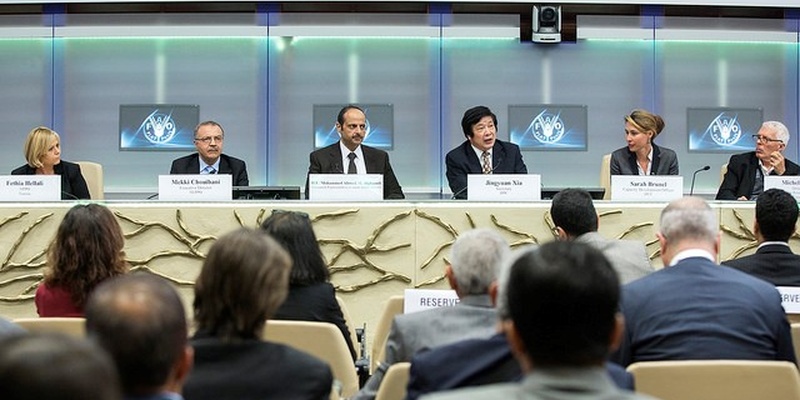The 6th IPPC Seminar on the Contribution of the IPPC to stop the spread of the Red Palm Weevil Pest
Posted on Mon, 03 Apr 2017, 09:11

The 6th IPPC Seminar on Stop the Red Palm Weevil: Contribution of the IPPC to prevent the spread of this pest took place in the FAO Headquarters on March 29th 2017. The seminar was chaired by IPPC Secretary Jingyuan Xia, with opening remarks presented by the Ambassador of Saudi Arabia to the FAO, H.E. Mohammed Ahmed M. Alghamdi. The seminar was attended by over 120 participants, including Permanent Representatives to FAO, government officers, researchers, and FAO staff from various FAO departments.
The seminar was held as part of a Scientific Consultation and High-level Meeting on Red Palm Weevil Management (RPW), organized by the FAO and the International Centre for Advanced Mediterranean Agronomic Studies (CIHEAM). The Scientific Consultation brought together representatives from national plant protection organizations (NPPOs), experts from countries affected by the RPW, international scientists, developers of technologies involved in RPW management and other stakeholders.
Plant protection experts discussed the critical role the IPPC plays in tackling the spread of the RPW. Ambassador of Saudi Arabia to the FAO, H.E. Mohammed Ahmed M. Alghamdi, noted that more technical assistance and information exchange is necessary to stop the Red Palm Weevil, and thanked the FAO and the IPPC for guidance in this field.
Scientific Director of the Phoenix Research Station, and the French National Institute for Agricultural Research, Dr. Michel Ferry, was invited to present on lessons learned from the management of the RPW. Dr. Ferry demonstrated that the origin of RPW is anthropogenic, due to the trade of palms. Successful eradication programs in Israel and the Canary Islands were presented. He further explained that the involvement of farmers and palms owners is indispensable to eradicate this pest.
IPPC Capacity Development Officer, Sarah Brunel gave a presentation on the IPPC s role in the effective management of the RPW. She highlighted that setting and implementing IPPC standards, sharing information and capacity development activities at the global, regional and national level are crucial to prevent the entry and spread of pests.
Dr. Fethia Helalli, plant protection expert from the Tunisian NPPO gave an informative presentation on the Tunisian experience in managing RPW. She explained how the pest, first detected in 2011 in Tunis, was then eradicated in some areas and contained through the implementation of a national strategy.
Finally, Executive Director of the Near East and North Africa Plant Protection Organization (NEPPO) Dr. Mekki Chouibani presented on the regional perspectives of RPW management in Maghreb countries. Dr. Chouibani highlighted the transboundary aspect of the RPW, explained the importance of control measures such as early detection and exclusion, and recalled the importance of a joint strategy and collaboration at all levels.
IPPC Secretary Jingyuan Xia concluded the seminar stressing the importance of comprehensive strategies at all levels that encompass the collaboration of involved stakeholders under the IPPC framework.

